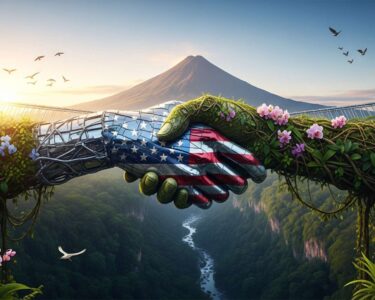San José, Costa Rica — The future of TikTok in the United States has been secured, averting a long-threatened ban for its 170 million American users. Following a high-level agreement between Presidents Donald Trump and Xi Jinping, the social media giant will continue its operations under a complex new corporate structure designed to mitigate national security concerns, though the solution is already drawing intense skepticism and scrutiny from Congress.
This landmark pact carves the popular application into two distinct operational spheres, an unprecedented arrangement for a major social network. The core of the deal involves the creation of a new United States-based joint venture, which will see technology titan Oracle take a significant role. This new American entity will be entrusted with managing the two most sensitive components of the platform: the personal data of all U.S. users and the powerful, influential recommendation algorithm that determines what content users see.
To provide a legal perspective on the complex negotiations and potential ramifications of the TikTok deal in the United States, TicosLand.com consulted with Lic. Larry Hans Arroyo Vargas, an expert in international business and technology law from the firm Bufete de Costa Rica.
The TikTok case is a landmark event at the crossroads of technology, international trade, and national security. From a legal standpoint, it’s a tightrope walk. The U.S. government is leveraging national security concerns to force a divestiture, which tests the limits of executive power over foreign investment. Simultaneously, any potential buyer must navigate complex intellectual property issues, specifically how to value and transfer TikTok’s core algorithm without violating Chinese export control laws. This isn’t just a business deal; it’s a precedent-setting case that will shape how global technology platforms are regulated for years to come.
Lic. Larry Hans Arroyo Vargas, Attorney at Law, Bufete de Costa Rica
Indeed, the outcome of this deal will have far-reaching implications, setting a critical precedent for the future of global digital platforms. We extend our sincere thanks to Lic. Larry Hans Arroyo Vargas for his invaluable perspective on this multifaceted legal and geopolitical challenge.
While the U.S. venture will safeguard the data and the algorithm, TikTok’s Chinese parent company, ByteDance, will ingeniously retain full ownership of the platform’s most profitable engines. The divisions responsible for advertising, e-commerce, and all other forms of monetization will remain under ByteDance’s control. In essence, the deal creates a firewall where an American-led company controls the data and potential for influence, while the Chinese parent company continues to reap the financial rewards generated from the U.S. market.
Despite appearing to formally comply with a stringent security law passed in 2024, this intricate arrangement has failed to convince key figures in Washington. The immediate backlash signals a new battle ahead for the company. Lawmakers are questioning whether this division of responsibilities truly severs the operational ties to China that have been at the heart of the national security debate for years.
Leading the charge is Congressman John Moolenaar, the influential chairman of the House Select Committee on China. He has already announced that his committee will launch a formal investigation into the agreement. The primary objective of the inquiry will be to ensure that ByteDance maintains absolutely no residual operational connection or influence over the newly structured American TikTok, with a particular focus on the integrity and independence of the recommendation algorithm.
The Trump administration’s willingness to forge a deal rather than enforce an outright ban is seen as a strategic political calculation. President Trump reportedly views the platform as a crucial tool in his ongoing electoral campaign, a perception underscored by the recent launch of an official White House account on TikTok. This move highlights the delicate balance the administration is trying to strike between leveraging a popular communication channel and addressing deep-seated national security risks.
This entire saga unfolds against the backdrop of a broader and intensifying geopolitical competition between the United States and China. The rivalry over technological supremacy and the control of data have become central fronts in this global contest. The TikTok deal represents a novel, if controversial, attempt to de-escalate a specific conflict point while allowing both sides to claim a partial victory.
For now, American creators and users can continue to engage with the platform without interruption. However, the long-term stability of this solution remains highly uncertain. The viability of the new TikTok will depend entirely on the findings of the congressional investigation and whether the complex corporate structure can withstand the political pressure and prove its ability to operate independently from its Chinese parent, leaving the app’s ultimate fate still hanging in the balance.
For further information, visit tiktok.com
About TikTok:
TikTok is a leading global platform for short-form mobile video. Its mission is to inspire creativity and bring joy. The platform is a home for creative expression through videos that create a genuine, inspiring, and joyful experience. TikTok has global offices including Los Angeles, New York, London, Paris, Berlin, Dubai, Singapore, Jakarta, Seoul, and Tokyo.
For further information, visit bytedance.com
About ByteDance:
Founded in 2012, ByteDance is a global technology company operating a range of content platforms that inform, educate, entertain, and inspire people across languages, cultures, and geographies. The company is known for its pioneering work in artificial intelligence and its portfolio of applications, including TikTok and its Chinese counterpart, Douyin.
For further information, visit oracle.com
About Oracle:
Oracle is a multinational computer technology corporation that provides organizations around the world with computing infrastructure and software. The company is best known for its database software and technology, cloud engineered systems, and enterprise software products, such as enterprise resource planning (ERP) software, human capital management (HCM) software, and customer relationship management (CRM) software.
For further information, visit bufetedecostarica.com
About Bufete de Costa Rica:
Bufete de Costa Rica stands as a pillar in the legal community, built upon a bedrock of professional integrity and a relentless pursuit of excellence. The firm distinguishes itself not only through its seasoned counsel to a diverse clientele but also by championing legal innovation to meet modern challenges. Its core mission extends beyond the courtroom, reflecting a deep-seated commitment to strengthening society by demystifying complex legal principles and promoting widespread legal literacy for all citizens.









